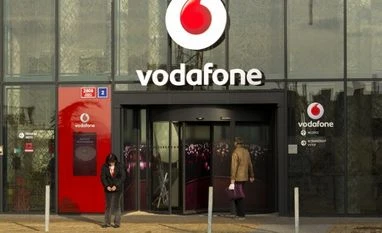Britain's Vodafone forecast a jump in cash generation this year, allowing it to reward shareholders with a higher dividend as it eases back on network investment and moves to solve problems in India where a new price war has broken out.
The company's upbeat outlook sent its shares more than 4 percent higher, relieving investors after a tough year that saw the group report a 6.1 billion-euro ($6.7 billion) loss, dragged down by last year's $5 billion write-downs on Vodafone India.
Chief Executive Vittorio Colao said that excluding the Indian business, adjusted core earnings rose 5.8 per cent to 14.1 billion euros, beating market expectations, and growing faster than revenues as the company improved efficiency.
He said earnings would grow by between 4 and 8 per cent this year to 14-14.5 billion euros - analysts had pencilled in 13.8 billion euros - and it would generate about 5 billion euros of cash, up from 4.1 billion euros last year.
The company said the level of cash generation, combined with growth and a robust balance sheet enabled it to "confirm a progressive dividend policy".
The final dividend was increased by 2 percent to 10.03 euro cents.
More From This Section
"We are getting into space where we see a balance between our investment needs, rewarding our shareholders and having good enough cash flow to pay for spectrum," Colao told reporters.
Analysts at Jefferies, who have a "buy" rating on the stock, said progress in reducing costs supported Vodafone's confident dividend growth guidance.
"Vodafone reasserts its intention to grow its dividend per share annually - consensus has dividend flat - a message that might be seen as contrasting against BT's more hesitant outlook last week," they said.
Struggling with a different set of problems, rival BT said last week in raising its dividend by 10 per cent that the growth rate would not be the same next year.
For Vodafone the growth in free cash flow, which will come as the company reduces investment following completion of its Project Spring programme to improve its networks in Europe and other markets, is ahead of analysts' predictions of 4.66 billion euros.
Regulatory headwinds in Europe, however, mean Vodafone's progress has been bumpy in the last year and will not be completely smooth in the year ahead.
Organic service revenue growth slowed to 1.5 per cent in the final quarter from 2.1 per cent in the third, due in part to reductions in roaming charges in Europe.
Chief Financial Officer Nick Read said regulation would continue to weigh this year, with a drag of about 1 percentage point.
The weak point in Europe for Vodafone was its home market, where revenue fell 4.8 per cent in the final quarter as it still battled to recover from the implementation of a new billing system more than a year ago.
Colao said the revenue decline was "flattening", although the market remained highly competitive.
Organic service revenue in Africa, Middle East and Asia Pacific grew 6.8 per cent in the final quarter, it said.
The impact of new cut-throat competition in India with the switching on of new market entrant Reliance Jio's $20 billion networks was laid bare by an 11.5 per cent drop in service revenue in the final quarter.
Vodafone agreed in March to combine its operations with Idea Cellular in a $23 billion deal aimed at creating the country's biggest telecoms business.
)